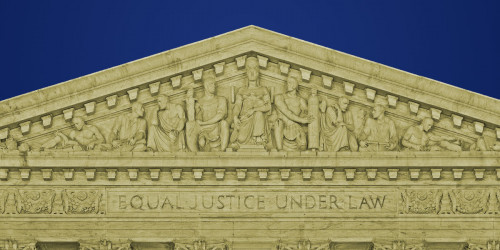This post was written by EFF legal intern Jisoo Hong.
A total ban on internet access and social media use as a condition of carceral release or probation is unconstitutional, EFF and partners argued in a friend-of-the-court brief filed with the North Carolina Court of Appeals in State of North Carolina v. Gault. EFF joined the American Civil Liberties Union of North Carolina, the American Civil Liberties Union, and the Duke Law School First Amendment Clinic in urging the court to hold that such a sweeping ban, which applies to lawful and routine internet use, is unconstitutional.
The brief argues that the total internet ban violates Gault’s First Amendment rights by denying him the ability to participate in and receive protected speech. The probation condition seriously inhibits Gault’s ability to function in a world where economic activity, government services, and medical care have moved overwhelmingly online, and internet use is otherwise inextricable from modern life. In an era where companies routinely direct you to their website or smart phone app, how can a person be expected to interact with their bank or buy a plane ticket without any access to the internet? The total internet ban includes social media—an important medium for political, religious, and artistic expression.
We also argue that the total internet ban violates Gault’s rights to due process because it is vague and readily inadvertently violated. Given the ubiquity of internet-connected home security systems, health tech, and payment integrations, anyone could unknowingly trigger an internet connection by completing mundane, everyday activities. The total internet ban would also function to endanger Mr. Gault’s economic survival in violation of the North Carolina Constitution since it is virtually impossible in modern society for an individual to get and hold a job without internet access.
EFF has long worked to oppose the abuse of state power in restricting the digital liberties of people involved in the criminal legal system. In 2016, EFF filed an amicus brief alongside allies Public Knowledge and the Center for Democracy & Technology, asking the U.S. Supreme Court to overturn a North Carolina law imposing a social media ban on registered sex offenders. The Supreme Court cited our brief in Packingham v. North Carolina in a unanimous opinion striking down the overbroad ban, holding that the law violated the First Amendment. EFF also filed an amicus brief with its allies in the Ninth Circuit in United States v. Chaker, arguing that the First Amendment prohibits the government from revoking someone’s supervised release for criticizing law enforcement online.
We hope the North Carolina Court of Appeals reverses the total internet ban it imposed on Mr. Gault as a condition of his probation.











